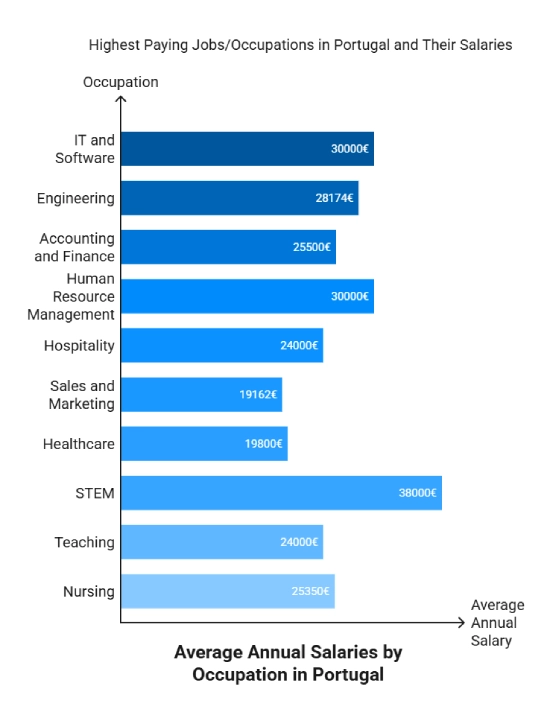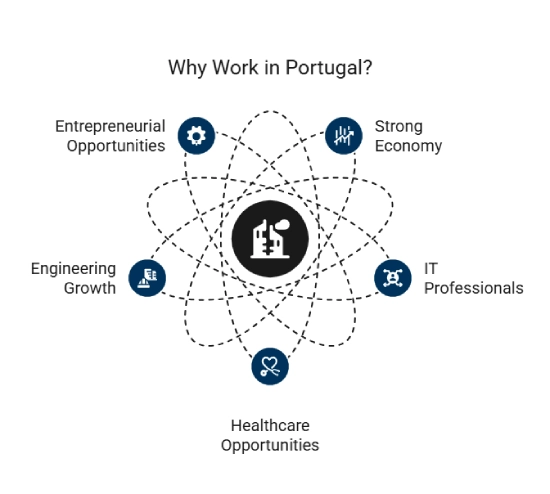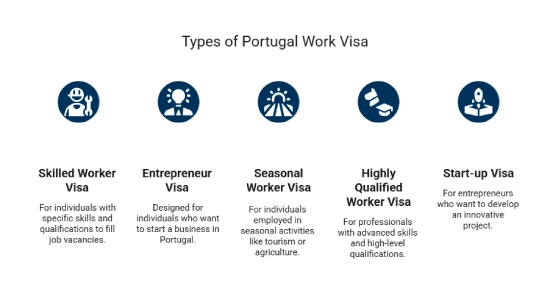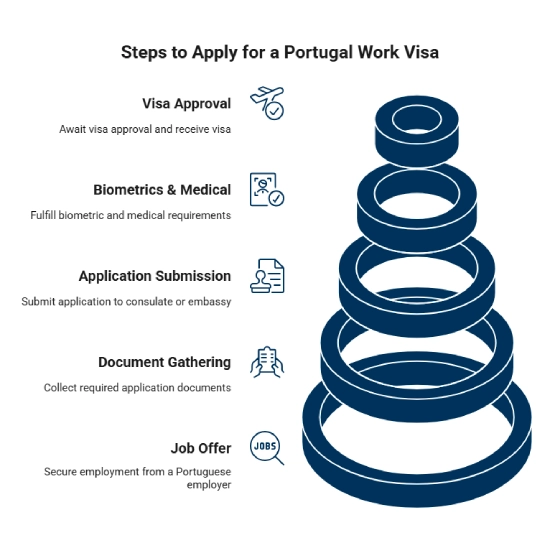Highest Paying Jobs in Portugal and Their Salaries
Portugal's job market is pretty good right now, especially if you've got skills. It's 2025, and the country's still growing, mainly in IT, engineering, and healthcare. Lots of Aussies are thinking about moving there because there's a need for skilled workers, especially in those jobs that pay well.
|
Occupation |
Average Annual Salary |
|
IT and Software |
€ 30,000 |
|
Engineering |
€ 28,174 |
|
Accounting and Finance |
€ 25,500 |
|
Human Resource Management |
€ 30,000 |
|
Hospitality |
€ 24,000 |
|
Sales and Marketing |
€ 19,162 |
|
Healthcare |
€ 19,800 |
|
STEM |
€ 38,000 |
|
Teaching |
€ 24,000 |
|
Nursing |
€ 25,350 |

Why Work in Portugal?
Portugal's got a pretty stable economy, and it doesn't cost a ton to live well there. Plus, it's one of the fastest-growing economies in Europe right now, with lots of money going into things like roads, tech, and health care. It's famous for its nice views, fun culture, and a good balance between work and life, which makes it a great place for professionals who've got skills. In 2025, Portugal’s job market is still changing, and skilled workers can find good-paying jobs. Here are some main points:
- Strong Economy: The Portuguese economy is getting bigger, so many areas need skilled people.
- IT Jobs: There's a big increase in the need for IT and software people, who can earn from €35,000 to €70,000 each year.
- Healthcare Jobs: Doctors, nurses, and other medical staff can earn from €45,000 to €90,000.
- Engineering is Growing: Engineers, especially those in civil, mechanical, and electrical fields, can earn up to €60,000 a year.
- Business Opportunities: More new companies mean business owners can invest and perhaps make a lot of money.

Migrate with a Portugal Work Visa
Moving to Portugal for work is usually not too hard, and they have different work visas depending on your job and skills. If you want a work visa for Portugal, you need to get a job from a Portuguese company first. They mainly give these visas to skilled workers in fields like IT, engineering, healthcare, and business.
There are different kinds of work visas you can get. If you have specialized skills, you can apply for the Highly Skilled Worker Visa. If you want to put money into a business or start one in Portugal, there's the Entrepreneur Visa. Also, the Seasonal Worker Visas are there for temporary jobs in hotels, farms, and other similar areas.
Once you get your work visa, you’re allowed to live and work in Portugal. After about 5 years, you can usually apply to live there permanently. This can then lead to becoming a Portuguese citizen, so you can fully use their social services, healthcare, and the like.
Introduction to Jobs in Portugal
Portugal’s job market is quite varied, with chances in tech, healthcare, engineering, and hospitality. The economy is growing, so there's a bigger need for skilled folks, mostly in tech, health, and finance. Pay can be different based on the job, but Portugal gives decent pay checks, especially for the people companies really want.
Types of Portugal Work Visa
Portugal offers several types of Portugal work visas to cater to a range of professional profiles and job sectors. These visas aim to bring skilled workers, business people, and seasonal staff to meet the country's varying job market needs. Here are the main types of work visas available:
- Skilled Worker Visa: This visa is for highly skilled people in fields like IT, engineering, and healthcare. Candidates must have a job offer from a Portuguese company for a skilled position that fits their skills and background. This visa lets foreign experts add to Portugal’s economy in fields where there is a big need.
- Entrepreneur Visa: For those who want to put money into or start a business in Portugal. This visa is aimed at people who want to create jobs, boost the economy, and help the country grow through new businesses. A solid business plan is key for this visa.
- Seasonal Worker Visa: This visa is for people working in seasonal jobs, mostly in farming, hospitality, and tourism. These jobs are usually temporary and only need workers during busy times, like summer or harvest.
- Highly Qualified Worker Visa: Made for experts with advanced degrees or special skills in areas like engineering, medicine, science, and other focused fields. Candidates must have a job offer for a highly skilled role and show they have deep knowledge or credentials in their field.
- Start-up Visa: This visa is for creative business people with a business idea or project that can help Portugal’s economy. The start-up visa is for those who plan to launch or grow their businesses, especially in tech, sustainability, and other new areas. Business people must prove their business can create jobs and grow the economy.
Each of these visas has its own needs and rules that relate to the applicant’s skills, job offer, and the kind of job or business they want to do in Portugal.

Requirements for Portugal Work Visa
To get a work visa for Portugal, you'll need to fulfill these conditions:
- You must have a job offer from a Portuguese employer.
- You need to show proof of your skills and job history.
- You should know Portuguese or English well enough for the job.
- You have to prove that you can afford to take care of yourself and anyone who depends on you.
- You should not have a criminal record and may need to pass a health check.
Work Visa and Residence Permit
Once you get a work visa, it serves as your residence permit, letting you live and be employed in Portugal. After being here for a set amount of time, usually five years, you can apply for permanent residency. The work visa also lets you use social security, healthcare, and other perks that Portuguese residents can get.
List of High-Paying Jobs in Portugal
Portugal is expected to keep offering good job opportunities in different fields in 2025, with some paying better than others. The best-paying areas are likely to be IT and software, engineering, healthcare, and finance. Portugal’s growing economy and need for skilled workers are creating these higher-paying jobs. Here’s a look at some of the top jobs in Portugal:
IT and Software
Industries Included: Technology, Digital Services, Cybersecurity
Portugal's growing tech sector needs software developers, cybersecurity experts, and IT project managers. The average salary is between €35,000 and €70,000, so Portugal is a draw for tech talent looking to help its digital economy expand. Software engineers are especially wanted in financial tech, AI, and online retail.
Engineering
Industries Included: Civil, Mechanical, Electrical, Environmental Engineering
In Portugal, civil, mechanical, and electrical engineers are vital to the country's expanding infrastructure projects and renewable energy fields. They usually earn between €45,000 and €60,000 annually. These engineers are often employed in important industries like construction, energy, and manufacturing, where they advance Portugal's sustainability efforts and tech improvements.
Accounting and Finance
Industries Included: Financial Services, Banking, Auditing
In Portugal's growing financial industry, financial analysts, auditors, and accountants are very important. They usually make between €30,000 and €50,000 a year. These professionals help businesses grow, create financial plans, and follow the rules. There are more and more job openings in private companies and in international businesses that want to have a presence in Portugal's developing economy.
Human Resource Management
Industries Included: Corporate, Staffing, Recruitment
As companies grow in Portugal, especially in tech, healthcare, and manufacturing, HR managers and recruiters are very important. These professionals, earning between €35,000 and €55,000, manage hiring, staffing, and employee relations. Their work keeps Portugal a competitive place to do business.
Healthcare
Industries Included: Hospitals, Clinics, Pharmaceutical, Research
There is a continued strong need for healthcare workers, especially doctors, nurses, and specialists. Portugal's aging population and growing healthcare system mean healthcare pros can expect to earn between €45,000 and €90,000 on average. Doctors and specialists, especially those in surgery and specialized medicine, can earn even more. The need for healthcare workers is expected to rise a lot in 2025.
Sales & Marketing
Industries Included: Digital Marketing, Advertising, E-commerce
Portugal's e-commerce and digital fields are growing, and they need digital marketers, sales managers, and business development experts to boost sales. People in these jobs can make between €30,000 and €50,000. There's growth in areas like online ads, influencer marketing, and sales strategy advice.
STEM (Science, Technology, Engineering, Mathematics)
Industries Included: Research, Biotechnology, Renewable Energy
Portugal's tech and science sectors rely on scientists, researchers, and tech innovators for continued growth. These jobs pay around €40,000 to €75,000 on average, and even more in up-and-coming areas such as biotech, renewable energy, and environmental science. Because Portugal is investing more in research and development, the need for STEM experts should keep growing.
Teaching
Industries Included: Education, Training, Higher Education
In Portugal, teachers usually make between €20,000 and €35,000 each year. It can change based on how long they've been teaching, where they are in the country, and how much education they have. The pay might not be great compared to some jobs, but teaching is still thought of as a good career. There's a need for teachers, particularly for languages and in schools for older students.
Nursing
Industries Included: Hospitals, Private Clinics, Elderly Care
Portugal always needs registered and specialized nurses, like those in the ICU or oncology departments. Depending on their specialty and how much experience they have, nurses can make between €30,000 and €50,000 each year. The healthcare system is growing, so nurses have many chances to move up in their careers and focus on certain roles.
Portugal has a varied economy with good job opportunities that pay well, and sectors like tech, healthcare, and finance are expected to keep growing. Portugal's good salaries and great quality of life look good to skilled workers thinking of moving there in 2025.
*Looking for work overseas? Y-Axis will guide you in step by step process.
Steps to Apply for a Portugal Work Visa
Getting a Portugal work visa is not hard, but you must pay attention to the details and follow some steps to make sure you qualify. Here’s a more in-depth look at how to do it:
Step 1: Secure a Job Offer from a Portuguese Employer
To get a work visa, you first need a firm job offer from a Portuguese employer. That employer has to be registered with the Portuguese government, and the job needs to fit your skills. This is key since your work visa depends on your job contract.
Step 2: Gather Necessary Documents
Once you receive a job offer, you'll have to collect the necessary paperwork. This usually includes a valid passport, proof of your qualifications like degrees or certificates, the job offer letter from your Portuguese employer, proof that you can financially support yourself while you're there, and any past work experience info or references, if you have them.
Step 3: Submit Your Application to the Portuguese Consulate or Embassy
Once you have all the needed papers, send your application to the Portuguese consulate or embassy in your country. You might have to make an appointment and send your documents online or in person, depending on what the consulate requires.
Step 4: Complete Biometric and Medical Requirements, If Needed
During the application, expect to give biometric data such as fingerprints and photos. A health check might be needed to meet health rules. The need for these medical checks depends on your visa type.
Step 5: Wait for Approval and Obtain Your Work Visa
After we process your application, you'll get your work visa approval. It usually takes 1 to 3 months. Once approved, you can live and work in Portugal with a residence visa. You'll also get details on how to pick up your residence permit when you get to Portugal.
Follow these steps, and you'll be set to work in Portugal. Once you arrive, you'll need to do a couple more things, like register with the local authorities and get your residence permit.This permit lets you stay and work for the length of your contract.

How Can Y-Axis Help You?
Y-Axis is a leading immigration firm. We offer immigration advice based on each client's unique needs and goals. Our services include:
- Expert guidance/counseling for working in Portugal
Looking for Inspiration
Explore what Global Citizens have to say about Y-Axis in shaping their future
Frequently Asked Questions
